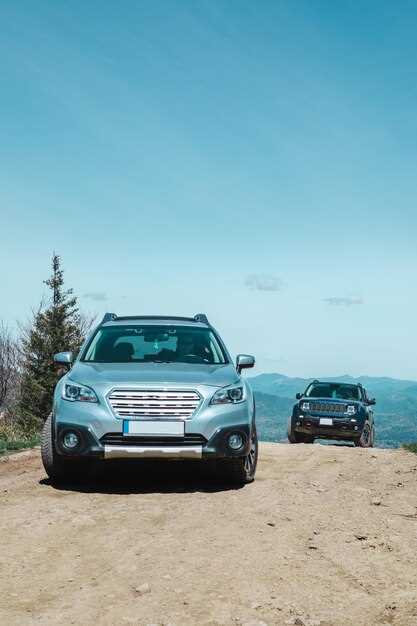
The compact SUV segment has gained immense popularity among consumers seeking versatility, reliability, and performance. Among the top contenders, the Toyota RAV4 and Subaru Forester stand out for their unique offerings and capabilities. This comparison aims to unpack the strengths and weaknesses of each model, providing a clearer choice for prospective buyers.
When it comes to practicality and everyday usability, both the RAV4 and Forester excel in different areas. While the RAV4 boasts a robust design and advanced safety features, the Forester focuses on delivering an exceptional all-wheel-drive experience, making it ideal for various terrains. Understanding these nuances is crucial when deciding which vehicle better suits your lifestyle and driving needs.
This article will dive deep into various aspects including performance, interior comfort, technology, and safety features of both the Toyota RAV4 and the Subaru Forester. Whether you prioritize sporty handling, rugged capability, or family-friendly amenities, our detailed comparison will equip you with the information needed to make an informed decision.
Performance Metrics: Engine Power and Fuel Efficiency

When comparing the Toyota RAV4 and the Subaru Forester, performance metrics such as engine power and fuel efficiency play a crucial role in determining the ideal choice for potential buyers. Both vehicles offer different engine options and efficiency ratings that cater to diverse needs.
Engine Power
The powertrain characteristics of both the RAV4 and Forester set them apart in various aspects:
- Toyota RAV4:
- Equipped with a 2.5-liter 4-cylinder engine, the RAV4 produces approximately 203 horsepower.
- Hybrid variants are also available, delivering an efficient combination of power and fuel economy.
- Subaru Forester:
- Features a 2.5-liter 4-cylinder engine that generates around 182 horsepower.
- The Forester emphasizes a balanced power delivery for both on-road and off-road driving, showcasing its AWD capabilities.
Fuel Efficiency
Fuel efficiency is a key consideration for many drivers, influencing long-term cost and environmental impact:
- Toyota RAV4:
- Gasoline models achieve an EPA-rated 28 mpg in the city and 35 mpg on the highway.
- Hybrid models significantly enhance fuel efficiency, with ratings of about 41 mpg city and 38 mpg highway.
- Subaru Forester:
- Offers an EPA rating of approximately 26 mpg in the city and 33 mpg on the highway.
- Despite slightly lower fuel economy than the RAV4, it remains competitive within the compact SUV category.
Conclusion
In summary, the Toyota RAV4 exhibits a clear advantage in both engine power and fuel efficiency, particularly with its hybrid option. The Subaru Forester, while marginally less powerful and fuel-efficient, compensates with its excellent all-wheel-drive system and off-road capabilities. Depending on your priorities, each vehicle has its own strengths that cater to varying driving preferences.
Interior Quality and Technology Features Comparison

The Toyota RAV4 and Subaru Forester are both popular choices in the compact SUV segment, renowned for their comfort and technology. When it comes to interior quality, the RAV4 leans towards a more modern and refined aesthetic, utilizing high-quality materials and a sleek design. Soft-touch plastics, an ergonomic layout, and well-cushioned seats create a pleasant atmosphere, making long drives enjoyable. In contrast, the Forester offers a more utilitarian feel, with durable materials that can withstand outdoor adventures, appealing to those who prioritize functionality over luxury.
In terms of technology, the RAV4 is equipped with an intuitive infotainment system featuring a large touchscreen, easy-to-navigate menus, and standard compatibility with Apple CarPlay and Android Auto. The available premium audio system enhances the driving experience, while advanced safety features come standard with Toyota Safety Sense, providing drivers with confidence on the road.
The Subaru Forester, on the other hand, comes with its own set of technological advantages. Its EyeSight Driver Assist Technology is renowned for enhancing safety through adaptive cruise control and pre-collision braking. The infotainment system, while functional, may not have the same level of polish as the RAV4, but it offers straightforward controls and features like Apple CarPlay and Android Auto as well. Additionally, the Forester boasts a remarkable amount of cargo space and rear passenger legroom, making it a practical choice for families and outdoor enthusiasts.
Overall, while the Toyota RAV4 excels in interior quality and a refined technology experience, the Subaru Forester stands out with its rugged utility and focus on safety. Buyers should consider their personal preferences and requirements when choosing between these two capable vehicles.
Safety Ratings and Off-Road Capabilities Analysis
When comparing the safety ratings of the Toyota RAV4 and Subaru Forester, the RAV4 consistently scores well in various crash tests conducted by reputable organizations such as the National Highway Traffic Safety Administration (NHTSA) and the Insurance Institute for Highway Safety (IIHS). The RAV4 boasts advanced safety features like Toyota Safety Sense, which includes pre-collision systems, lane departure alerts, and adaptive cruise control, enhancing overall driver and passenger protection.
On the other hand, the Subaru Forester also receives high marks for safety, with similar accolades from the IIHS and NHTSA. The Forester is equipped with Subaru’s EyeSight Driver Assist Technology, which provides a robust suite of features aimed at collision prevention and enhancing driver awareness. The Forester’s structural integrity combined with its all-wheel-drive system contributes to excellent ratings in various weather conditions.
In terms of off-road capabilities, the Subaru Forester has a reputation for outstanding performance in rugged terrains, thanks to its standard all-wheel-drive system and higher ground clearance. This makes it particularly well-suited for adventurous driving in challenging conditions, such as snow, mud, or uneven surfaces.
Conversely, the Toyota RAV4 offers an optional all-wheel-drive configuration that can be beneficial for light off-road scenarios. While the RAV4 is capable on unpaved paths, its suspension and design are more oriented towards on-road comfort and efficiency rather than extreme off-roading. The RAV4 Adventure and TRD Off-Road trims do enhance its capability, providing additional features geared toward outdoor enthusiasts.
Ultimately, the choice between RAV4 and Subaru Forester in terms of safety and off-road capabilities depends on the buyer’s priorities. Those seeking top safety ratings along with a balance of on-road comfort may lean towards the RAV4, while individuals focused on rugged off-road performance and reliability might prefer the Subaru Forester.
